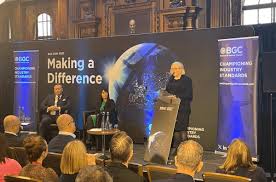The Stuart Andrew and Baroness Twycross Love In
This AGM was notable as the first since Labour’s election victory, with Baroness Twycross stepping up as Gambling Minister to offer soothing words about how she believes in a “growing gambling sector”
HORSE RACING
Ed Grimshaw
3/3/20254 min read


Last week the Betting and Gaming Council’s AGM took place—where the great and the good of the gambling industry gather in an echo chamber so thick with self-congratulation, you could spread it on toast. This year’s theme? "Making a Difference." Which is a bit like the Titanic’s captain hosting a conference on iceberg safety.
Held at the Institute of Civil Engineers—because nothing screams "high standards" like borrowing a venue from the people responsible for Britain’s crumbling infrastructure—the summit saw leading political figures turn up to nod approvingly while industry leaders patted themselves on the back for their economic contributions. A robust £6.8bn to the economy, £4bn in tax, and 109,000 jobs! And yet, not a single mention of the countless punters who are now required to undergo forensic-level financial background checks just to place a modest weekend flutter.
The Art of Ignoring Inconvenient Truths
BGC CEO Grainne Hurst declared that the industry must "not allow anti-gambling prohibitionist campaigners to continually attack a hobby enjoyed by over 22.5 million people each month." Which is a beautifully crafted line—because it lumps anyone who questions affordability checks, restrictive regulations, or the blatant exclusion of everyday punters from the conversation into the category of prohibitionists.
But here’s the thing: the real attack on betting isn’t coming from so-called “anti-gambling” campaigners. It’s coming from the very politicians and regulators invited into that AGM. The same people who are "working together" with the industry while also rolling out affordability checks so draconian that placing £150 in your account now requires proof that you’re not laundering money via Ladbrokes.
Of course, there was no time to discuss the sheer madness of a system where a middle-aged factory worker must submit bank statements and explain their mortgage payments just to place an accumulator. No, no—far more important was the BGC’s opportunity to trumpet its support for the Government’s ambitious growth agenda (whatever that means).
When the Racing and Betting Establishment Collide
The betting industry likes to remind us that it is “the beating heart of so many sports we all love, sports like horseracing, football and darts.” This is true—but racing, in particular, is suffering the most from the bizarre doublethink of political interference.
On one hand, politicians and racing executives wail that the sport is underfunded, attendance is dwindling, and punters need to be encouraged back to the track. On the other, the Gambling Commission is actively pushing people away with affordability checks that assume every punter is on the brink of financial ruin.
But rather than tackle this head-on, the racing media and establishment figures prefer to sit politely at events like the BGC AGM, applauding the very people who are making it harder for racing’s core audience to have a bet. You’d think, given that racing literally depends on betting to survive, someone might mention this contradiction? Instead, racing continues to act like a grateful peasant at a feudal banquet, hoping for crumbs from the BGC’s table.
Labour’s “Bold” Vision for Growth – Just Don’t Mention Punters
This AGM was notable as the first since Labour’s election victory, with Baroness Twycross stepping up as Gambling Minister to offer soothing words about how she believes in a “growing gambling sector” while also talking about making it “even safer.” Translation: we want your tax money, but we’ll keep treating your customers like wayward children.
Meanwhile, the Shadow Secretary of State Stuart Andrew assured the room that “betting and gaming are integral parts of the UK’s world-leading entertainment industry.” All very nice—but notice how no one ever acknowledges that this industry is built on the people who actually place bets. The working-class punters, the racecourse regulars, the lads who put an accumulator on every Saturday—they’re never mentioned. Instead, gambling is framed as a vague "leisure activity" that must be carefully managed by responsible operators, politicians, and regulators.
What Wasn’t Said: The Wilful Blindness Over Affordability Checks
The most stunning omission from this grand affair was any meaningful discussion of affordability checks—because, let’s be honest, if the people in that room had to go through the same invasive nonsense as regular punters, there would be an outcry. Imagine the reaction if politicians had to send their payslips and mortgage statements to a government panel before being allowed to buy a second bottle of Châteauneuf-du-Pape at lunch?
The irony, of course, is that the very same politicians who supposedly represent the interests of punters are the ones ignoring the fact that their affordability rules are strangling them. The week affordability checks started being triggered by £150 monthly deposits should have been the moment the industry, the racing establishment, and even the betting firms themselves stood up and said: "This is absurd." Instead, they kept quiet, lest they offend the very regulators and politicians they now schmooze at AGMs.
Final Thoughts: Who is Betting Actually For?
This AGM, like so many before it, was a gathering of industry executives, politicians, and media figures talking about betting, but never to the people who actually sustain it. They’ll wax lyrical about economic growth, responsible gaming, and “working together” with regulators—but they won’t ask why an ordinary punter now has to prove they can “afford” a £10 each-way bet.
At this rate, the future of betting will belong to two groups: the ultra-wealthy, who can breeze through affordability checks without a second thought, and the black market, which will gladly take the business of every over-regulated punter.
If racing and betting continue to exclude their real audience from the conversation, they may find that one day, there’s no one left at the table except the regulators and the boardroom executives, toasting to an industry they’ve successfully regulated into oblivion.
